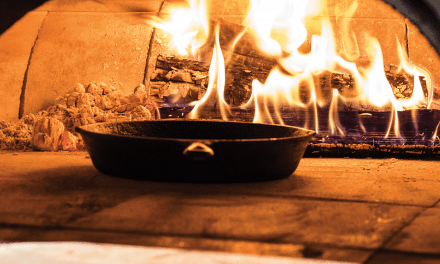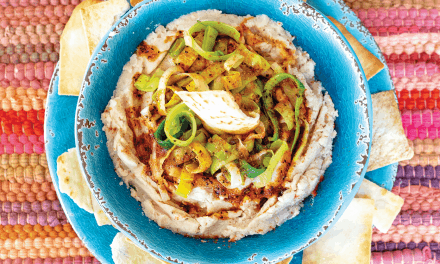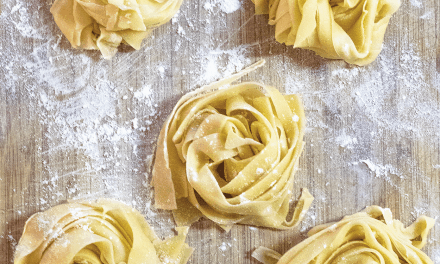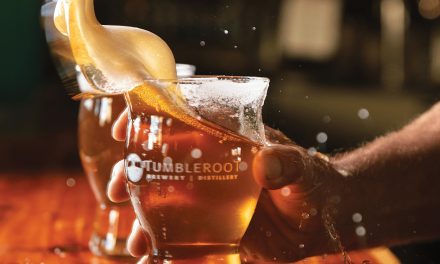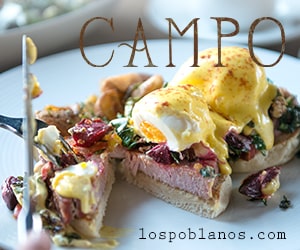
Truffles sit clustered in little groups behind glass, wrapped in brightly colored foil, gleaming like jewels in a display case. To the right are crisply wrapped bars, neatly stacked by origin and flavoring. A look over past the counter reveals high ceilings, bright white walls and spotless steel appliances. It’s clear Eldora Chocolate is a brand new business. That is, until Steve Prickett, master chocolate maker and founder, begins talking about it.
Maybe it’s the air of self-assurance, the clarity of his vision, or the custom apron he wears throughout our visit, but the way he speaks about Eldora, you’d think it had been around for 20 years. “We’re not interested in just standing on our laurels. We want to be recognized on a national scale,” Prickett says. “We recognize we’ve only been in business a month but we have to act as if we’re going to be on that national level.”
This kind of attitude drives Eldora, and it shows in every aspect of the operation.
Yes, it’s only been a month. But Prickett, true to his word, is out to inform his people about this kind of chocolate: dark, complex, and delicious. In doing so, he’s blazing a trail for bean-to-bar chocolate (that is, chocolate made by processing the cocoa beans in-house) in Albuquerque.

“We view chocolate as food.” He says. “I know a lot of people think of chocolate as candy, but we think it’s food because there’s no artificial flavors in anything we have – it’s all real ingredients.” There are truffles in flavors like blood orange and bourbon. Ice cream bon bons with ice cream from La Lecheria in Santa Fe. Bars with pink salt and sour cherry. Perhaps most distinctive are the lineup of single origin 1-oz 70% squares, ungarnished to let the flavors shine: Bars from Ecuador (Ecuadorian chocolate is “the old comfortable pair of shoes”) Tanzania (“stylin’ shoes”), the Dominican Republic, Venezuela, and Guatemala. “If you taste these and they all taste the same, then I would be surprised,” Prickett says.
Prickett and his team take the most pride in creating nuanced, flavorful bars that customers recognize. He says, “What makes us happy is that you try it, and you say, ‘wow I got 4 out of the 6 flavors that we recognized – then we think we’ve accomplished something.” To preserve that range, certain methods are key. Unlike other chocolatiers, he keeps back-stock chocolate in a temperature controlled walk-in fridge at exactly 55 degrees, and even did a taste comparison to confirm what he suspected: that chocolate kept fresh in the cooler did, in fact, retain more flavor than chocolate left out.
Visiting the converted building now home to Eldora is in itself an exercise in chocolate as a precise science. A homey entry area gives way to a vast industrial kitchen with whirring machinery and pops of bright color: picture Willy Wonka with a toned-down chemistry-lab aesthetic. The retail area was skillfully designed by Andrea Prickett, Steve’s wife, who works as an interior designer, and features a white palette trimmed with intricate botanical wallpaper and industrial touches.



Prickett buzzes with energy, eager to whisk me off on a tour of the rest of the facility: there’s the world map with pins pointing to the five origins of the cocoa beans (Prickett started with 24 varieties, and narrowed down: “The reason these were selected as finalists out of my 24 was their flavor profile and their differences in flavor profile.”) There’s a room for buckets of cocoa beans, a roaster, and a winnower to separate the flaky coating of the beans from the hard insides. It was specially handmade by a machine shop down the road called the Salty Dog. Two conchers, which grind the cacao beans to a fine liquid, sit heating at the ready. He lets me sample the resulting warm chocolate liqueur with a spoon dunked into the pot: a Venezuelan variety that is rich with a brightly sweet edge. It’s delicious.
With the bloom of craft breweries or third-wave coffee outfits in recent years have emerged a handful of craft chocolatiers have fleshed out this kind of obsessively meticulous, socially conscious appeal. “We’re going to have to create the niche, because people have to understand how chocolate is different – what’s a good chocolate versus an industrialized chocolate,” Prickett says. “We’re happy to do that, because that’s what we’re about and we just won’t vary from that.”
Prickett wasn’t a novice to the business of locavore, small-batch culture, but had always been a devotee to tasting fine chocolate. After retiring from a decades-long career in finance, the Pricketts went on a tour of a cacao plantation in Hawaii. Something clicked, and Prickett dove headfirst into chocolate technique, first tinkering with at-home batches and later taking classes with Ecole Chocolat, an online chocolatier program, and interning with ChocoSol in Toronto to hone his knowledge.

Now well into production, Prickett counts Ritual Chocolate in Utah and Askinosie out of Missouri among his inspirations. His buzzwords are “natural, fair trade and organic.” The buyers that bring him beans, including Uncommon Cacao, work with cacao farmers who for all intents and purposes practice organic farming – just without the gratuitously expensive “certified organic” label. Pricket pays well over market value for the beans, hoping to ensure fair pay for the cacao growers. Every ingredient, including “inclusions,” which are what Prickett calls add-ins like spices or lingonberry, are sourced responsibly. Eldora has even begun donating part of their profits to the Heirloom Cacao Preservation Fund, microlender Kiva, and the Rainforest Trust.
But as ambitious as Prickett’s ultimate goals are, the importance of local networks isn’t lost on him. Most of his small staff found him through social media, and his pride for the team of four is palpable. “I’m absolutely super lucky,” he said. Prickett’s already planning to send them out-of-state to learn more about chocolate. He’s found that the neighborhood has embraced him, noting with pride a number of regulars who come for the specialized bars and even his “Kapow” energy bars and “creamer” mixes, powdered coconut milk and spice blends that can be added to drinks. Eldora even offers real hot chocolate made with blended chocolate pieces and added flavorings mixed in to order.
He’s unconcerned with a North-valley location that’s slightly out of the way – in fact, he welcomes it. “The ethos of this area is back to the farm, back to the table – let’s get back to the origins of where things are,” he says. “Can we make things that fit, not only to eat well, but that are also good for the community?” Eldora just put out a lavender and lemon chocolate bar with lavender from Los Poblanos, and has a coffee flavored bar with air roasted coffee from local V Roast Coffees.
“If you’re going to spend the time to come out to see us, we’re going to make it a good experience,” Prickett says. “We’re going to treat you to a complete understanding of what chocolate is about, so when you ultimately buy, you’re informed, and we think we owe that to our customers.” Albuquerque, meet bean-to-bar chocolate.
Eldora Chocolate
8114 Edith Blvd NE, Albuquerque, NM 87113
www.eldorachocolate.com
Sophie Putka is a full-time journalist and part-time food writer and photographer. She has been a barista, outdoor educator, and mushroom farmer at local New Mexico businesses, and lives in Albuquerque with her dog Iggy.






